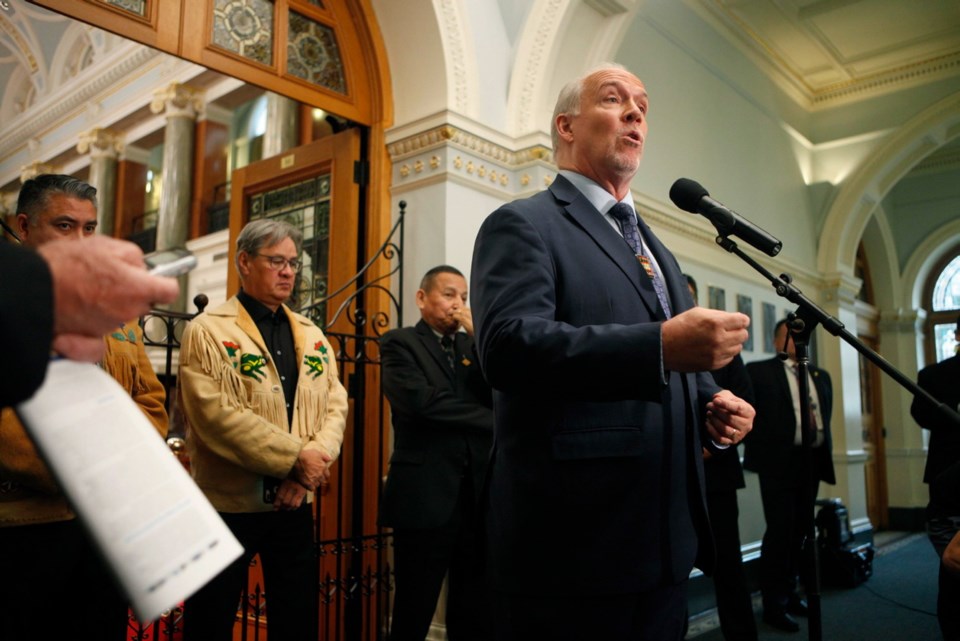Considering it’s only three pages long and is devoted mostly to an “action plan” yet to be written, there was an enormous amount of hope and expectation around Bill 41, introduced Thursday.
It’s the Declaration on the Rights of Indigenous Peoples Act, B.C.’s bid to enshrine a UN resolution to the same effect. If the goodwill on display during the native dancing, prayers and rejoicing from Indigenous leaders that accompanied the bill is an indicator, it has a promising future.
But there have been moving moments before over the years, and the courts — and sometimes the roads — are still clogged with arguments and protests.
The centrepiece of the fall legislative sitting is the reconciliation bill. It’s the first of its kind in Canada, although the federal government is expected to follow suit.
The three pages, of course, are just a start. The interpretation section requires that while knitting the sweeping declaration into the workings of government, it must consider the diversity of Indigenous Peoples in B.C., particularly the “distinct languages, cultures, customs, practices, rights, legal traditions, institutions, government structures, relationships to territories and knowledge systems of the Indigenous peoples in British Columbia.”
There have been efforts to varying degrees to do just that over the years. But turning political impulses into legal requirements imposed on government is an enormous undertaking.
Section 3 hints at the work ahead: “In consultation and co-operation with the Indigenous Peoples of B.C., the government must take all measures necessary to ensure the laws of B.C. are consistent with the declaration.”
The action plan sounds like it will become a permanent ongoing part of the agenda. It must be developed in consultation and co-operation with First Nations. It has to be made public as soon as possible and tabled in the house.
An annual report must be prepared every fiscal year based on the action plan, in consultation and co-operation with Indigenous leaders, which must itemize progress on the Section 3 requirement above.
It’s the subsequent section on decision-making agreements that hints at how far-reaching the changes might be.
“For the purposes of reconciliation,” cabinet can enter into an agreement with an Indigenous governing body relating to the exercise of statutory decision power, or the consent of the Indigenous body.
“Power” is the key word. The bill makes it easier to share power; in fact, it requires it. And B.C. will be sharing a lot more power than it once did.
It’s an effort to fulfil one key part of the UN declaration calling on government to “consult and co-operate in good faith with the Indigenous Peoples concerned through their own representative institutions in order to obtain their free, prior and informed consent before adopting and implementing legislative or administrative measures that may affect them.”
There are dozens of other tenets that recognize Indigenous self-determination, rights to compensation and much more.
The argument has been running for years about whether requiring prior and informed consent constitutes a veto for First Nations. Premier John Horgan and First Nations leaders say no.
The word doesn’t appear in the declaration or anywhere else. But there’s enough weight attached to the need for “consent” that makes people wonder.
Any skepticism is muted at this point. No major interest group with any standing is on record opposing the intention of the bill. The government supplied no fewer than 20 canned quotes from across the spectrum validating it.
Union of B.C. Indian Chiefs leader Stewart Phillip, one of several First Nations leaders who spoke on the floor of the legislature, described B.C. natives as being in the back of the car.
“The back seat is incredibly crowded and everyone in the back seat is saying; ‘Are we there yet? … When are we going to get there?’
“We’ll get there when we get there, but at least we have a vehicle.”
Passage of the bill is guaranteed, probably unanimously, because the Opposition Liberals and the Green caucuses endorsed it promptly.
The hypothetical question remains: What happens when something a provincial government considers vital to the province’s future doesn’t get consent, or gets 50, or 75 per cent consent?
Said the premier: “Those are bridges we should cross when we get to them.”



